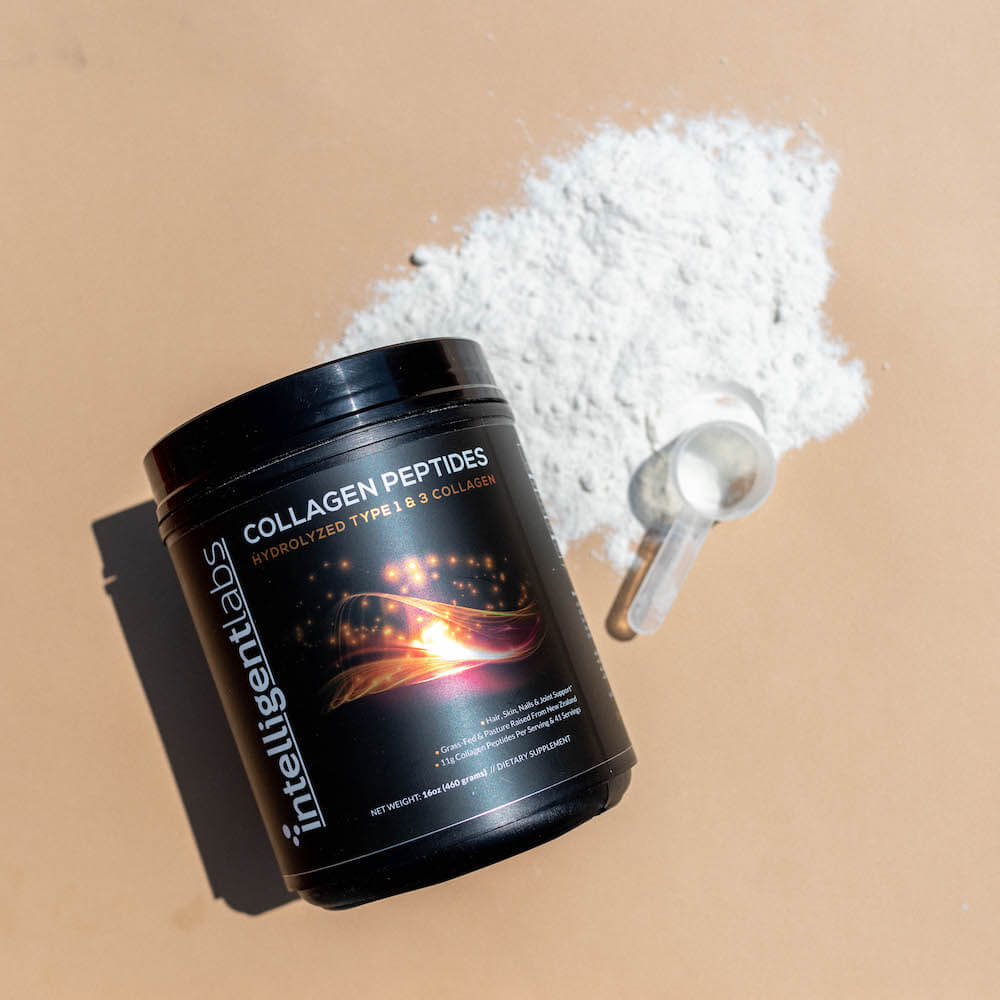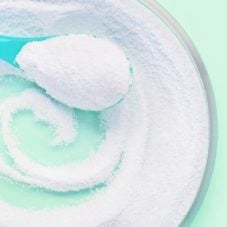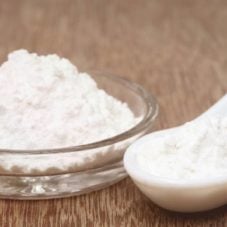Did you know that our Collagen Peptides (popularly known for its skin, hair, and nail benefits) may also promote good gut health? Yep, surprising, isn’t it? In this post, we’re going to chew over whether adding collagen to your diet is a good decision for maintaining a healthy gut. Let’s go over the details!
Table of Contents
What is “the gut”? Where is it exactly?
The gastrointestinal tract, commonly referred to as the gut, spans from the mouth to the anus, measuring up to 9 meters post-mortem but shorter in a living body due to muscle tension.
The gut is host to trillions of microbes such as bacteria, fungi, and viruses. An imbalance in these microbes, known as gut dysbiosis, can lead to health issues.1
The gut is also considered the body’s “second brain,” equipped with its own nervous system that independently manages various gut processes, potentially leading to conditions ranging from minor discomfort to life-threatening issues.2
How can collagen help promote good gut health?
As the most abundant protein in the body, collagen is found in the lining of the gut, as well as in many other places, such as the skin (the largest organ in the body), bones, tendons, ligaments, heart, brain, and, of course, the hair and nails.3
But there’s a problem with “native” or “whole” collagen – its molecules are too big, making digestion and absorption difficult. This is why collagen supplements like our multi collagen powder come in peptide or hydrolyzed form.
Collagen peptides go through a process known as enzymatic hydrolysis, which breaks down full-length collagen into short chains of amino acids called peptides, thereby making them more bioavailable.4
For this reason, collagen peptides are great for people with gut issues as they are more easily digested, absorbed, and transported in the bloodstream, so the body can use it to repair tissue and build muscle.5
In one study, smooth muscle cells were isolated from the jejunum, a part of the small intestine that absorbs nutrients from food. The cells were capable of collagen synthesis, suggesting that collagen production in the intestine does help with gut repair.6
This gut repair action helps reduce inflammation, allowing food to pass through the gut easily. Reduced inflammation also means better absorption of nutrients from the food you eat.
Overall, collagen’s anti-inflammatory function helps address some unhealthy gut signs, which we’ll cover in the next section. (6)

Which amino acids (from collagen) have gut benefits?
Here are some amino acids found in collagen supplements with gut-specific action:
Glutamine
Glutamine is said to help with “leaky gut syndrome”, a condition with increased intestinal permeability where bacteria and toxins leak through the intestinal wall. The gut wall does exhibit some permeability to allow nutrients to pass through, but it keeps the harmful ones out simultaneously.7
A functioning gut barrier is important because once pathogens “leak” inside, they can enter the bloodstream and wreak havoc on the body. Rapid resealing of the gut wall is therefore required to stop further damage. Fortunately, there is evidence that glutamine can improve gut barrier conditions and reduce the frequency of infections, even in critically ill patients.8
Note:
You may notice that many collagen brands use glutamic acid instead of glutamine. Glutamic acid is a precursor for glutamine, and conversion between these two forms is done by the body when needed.9
Glycine, Histidine, Arginine, and Threonine
Research has shown that these amino acids are beneficial to patients with inflammatory bowel disease. Histidine can suppress oxidative stress in the gut. Glycine offers protection against gut inflammation and other kinds of organ injuries. Threonine also has a role in maintaining balance in the gut, and along with arginine and glutamine, helps maintain gut barrier function and intestinal wound repair.10
What are some signs of an unhealthy gut or unbalanced microbiome?
Digestive issues like flatulence, bloating, abdominal pain, constipation, and loose stools are primary indicators of an unbalanced microbiome. However, there are also less obvious signs.
Food intolerance
This occurs when people have difficulty digesting certain foods they crave, leading to digestive discomfort. Unlike dangerous food allergies, food intolerance is generally unpleasant but not life-threatening, often caused by conditions like lactose intolerance, fructose intolerance, and gluten sensitivity.11 12
Inflammation
The gut is a major immunological organ, hosting about 70% of the immune system. An imbalanced microbiome can trigger inflammation, which, if chronic, may lead to diseases like Crohn’s disease, irritable bowel syndrome, celiac disease, and ulcerative colitis. If left unchecked, systemic inflammation can also lead to obesity, diabetes mellitus, and metabolic syndrome.13 14
Skin issues
Surprisingly, gut problems can also lead to skin problems. This is because, as mentioned above, gut dysbiosis can alter the immune response, leading to changes in skin conditions. Some skin problems that arise from poor gut health include psoriasis, atopic dermatitis, dandruff, acne, and even skin cancer.15
Poor sleep quality
You read that right – problems in the gut microbiome can impact sleep. Gut bacteria not only help with digestion, but they also produce neurochemicals and hormones that the brain uses to regulate sleep, memory, mood, learning, and more.16
The so-called brain-gut-microbiome axis (BGMA) is also bi-directional, meaning gut problems that lead to sleep issues can also happen in reverse, that is, sleep issues can also cause gut problems.17
Collagen is good for gut health but it’s not a miracle cure…
To conclude this blog post, yes, one of the many benefits of collagen supplements is gut health support. But it’s far from being a miracle cure. The gut is far too complex for collagen to handle alone!
For optimal gut health, supplement with our Collagen Peptides (learn when you should take them and how much to take daily) and maintain a balanced diet full of vegetables, fruits, grains, dairy, and protein. Ensuring you get all the necessary macronutrients and micronutrients daily supports not just your gut but your overall wellness, too.
💬 Something on your mind? Share your thoughts in the comments. We love hearing from curious minds.
📩 And while you’re here, join our newsletter for more smart stuff (and secret perks)!
References:
- Part 1: The Human Gut Microbiome in Health and Disease. Bull MJ, Plummer NT. Integr Med (Encinitas). 2014;13(6):17-22. ↩︎
- Building a second brain in the bowel, Marina Avetisyan, Ellen Merrick Schill, and Robert O. Heuckeroth, Published February 9, 2015 ↩︎
- From National Library of Medicine, https://www.ncbi.nlm.nih.gov/ ↩︎
- Hydrolyzed Collagen—Sources and Applications. León-López A, Morales-Peñaloza A, Martínez-Juárez VM, Vargas-Torres A, Zeugolis DI, Aguirre-Álvarez G. Molecules. 2019; 24(22):4031. ↩︎
- The impact of collagen protein ingestion on musculoskeletal connective tissue remodeling: a narrative review, Andrew M Holwerda , Luc J C van Loon, Nutrition Reviews, Volume 80, Issue 6, June 2022, Pages 1497–1514 ↩︎
- Collagen synthesis by human intestinal smooth muscle cells in culture, Martin F. Graham, David E.M. Drucker, Robert F. Diegelmann, Charles O. Elson, Gastroenterology Volume 92, Issue 2, February 1987, Pages 400-405 ↩︎
- Glutamine: Metabolism and Immune Function, Supplementation and Clinical Translation. Cruzat V, Macedo Rogero M, Noel Keane K, Curi R, Newsholme P. Nutrients. 2018; 10(11):1564. ↩︎
- Intestinal permeability and systemic infections in critically ill patients: effect of glutamine. De-Souza DA, Greene LJ. Crit Care Med. 2005;33(5):1125-1135. ↩︎
- Glutamine and glutamate, H Tapiero, G Mathe… Biomedicine & Pharmacotherapy Volume 56, Issue 9, November 2002, Pages 446-457 ↩︎
- The Role of Dietary Nutrients in Inflammatory Bowel Disease, Kohei Sugihara, Tina L. Morhardt, Nobuhiko Kamada, Front. Immunol., 15 January 2019, Sec. Mucosal Immunity, Volume 9 – 2018 ↩︎
- Food Intolerances. Tuck, C.J.; Biesiekierski, J.R.; Schmid-Grendelmeier, P.; Pohl, D. Nutrients 2019, 11, 1684 ↩︎
- Review article: the diagnosis and management of food allergy and food intolerances. Turnbull JL, Adams HN, Gorard DA. Aliment Pharmacol Ther. 2015;41(1):3-25. ↩︎
- Factors Influencing the Gut Microbiota, Inflammation, and Type 2 Diabetes. Wen L, Duffy A. J Nutr. 2017;147(7):1468S-1475S. ↩︎
- Diet-Induced Dysbiosis of the Intestinal Microbiota and the Effects on Immunity and Disease. Brown K, DeCoffe D, Molcan E, Gibson DL. Nutrients. 2012; 4(8):1095-1119. ↩︎
- Gut–Skin Axis: Current Knowledge of the Interrelationship between Microbial Dysbiosis and Skin Conditions. De Pessemier B, Grine L, Debaere M, Maes A, Paetzold B, Callewaert C. Microorganisms. 2021; 9(2):353. ↩︎
- That gut feeling, By Dr. Siri Carpenter, September 2012, Vol 43, No. 8 Print version: page 50 ↩︎
- Gut microbiome diversity is associated with sleep physiology in humans, Robert P. Smith,Cole Easson,Sarah M. Lyle,Ritishka Kapoor,Chase P. Donnelly,Eileen J. Davidson,Esha Parikh,Jose V. Lopez,Jaime L. Tartar, Published: October 7, 2019 ↩︎




